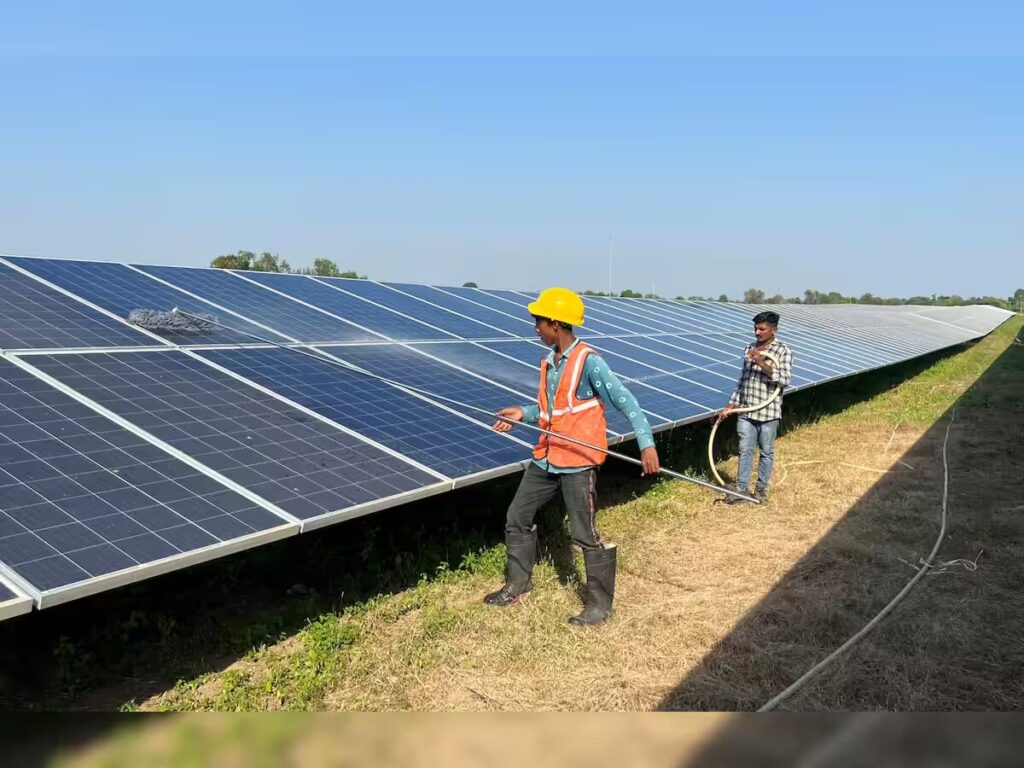Solar project

Innovative Solar Energy Solutions in Maharashtra: Mumbai, Navi Mumbai, Nagpur, Nashik, Thane, Pune and Aurangabad
Key Components of Solar Energy Systems
High-Efficiency Solar Panels (Photovoltaic Cells):
- High-efficiency monocrystalline or polycrystalline solar panels.
- Mounted on rooftops, ground, or solar farms.
Advanced Inverters:
- Convert direct current (DC) generated by solar panels to alternating current (AC) for use in homes and businesses.
- Grid-tied, off-grid, or hybrid inverters depending on the project requirements.
Mounting Systems:
- Fixed-tilt or tracking systems that adjust panel angles to follow the sun’s movement, maximizing energy capture.
- Durable and weather-resistant materials to ensure longevity.
Battery Storage (if applicable):
- Lithium-ion or other advanced battery technologies to store excess energy.
- Ensures a continuous power supply during non-sunny periods.
Monitoring and Control Systems:
- Real-time monitoring for performance analysis and maintenance.
- Automated control systems to optimize energy production and distribution.
Implementation Phases:
Feasibility Study:
- Assess solar potential, financial viability, and environmental impact.
- Conduct site surveys and gather data on sunlight exposure and local weather patterns.
Design and Planning:
- Develop detailed engineering designs and system specifications.
- Obtain necessary permits and approvals from regulatory authorities.
Procurement and Installation:
- Source high-quality solar panels, inverters, and other components.
- Professional installation ensuring safety standards and optimal performance.
Commissioning and Testing:
- Conduct thorough testing to ensure all components function correctly.
- Integrate the solar system with the existing power grid or standalone systems.
Operation and Maintenance:
- Regular maintenance to keep the system operating efficiently.
- Periodic performance evaluations and upgrades as needed.
Key Benefits of Solar Energy Adoption
Environmental Impact:
- Significant reduction in carbon footprint and greenhouse gas emissions.
- Conservation of natural resources by decreasing reliance on fossil fuels.
Economic Advantages:
- Long-term savings on energy bills for households and businesses.
- Potential revenue from selling excess power back to the grid.
Energy Independence:
- Increased energy security by diversifying energy sources.
- Reduced vulnerability to energy price fluctuations and supply disruptions.
Community and Social Benefits:
- Job creation in the renewable energy sector.
- Educational opportunities and increased awareness of sustainable practices.
Solar Power Implementation Across Maharashtra’s Cities
Solar Project in Maharashtra
Solar project in Maharashtra is taking significant steps in the adoption of solar energy, with multiple projects being implemented across its cities. These initiatives promote renewable energy, reduce dependency on fossil fuels, and create a sustainable future. Cities like Mumbai, Pune, Nagpur, Nashik, Thane, Navi Mumbai, and Aurangabad are leading this transition, making Maharashtra a key player in solar power adoption.
Solar Project in Pune
Solar project in Pune has experienced rapid growth, mainly due to its IT and manufacturing industries. Large-scale rooftop solar installations, solar farms, and battery-integrated solar solutions for data centers and tech parks are transforming the city’s energy landscape. With strong government incentives and increasing environmental awareness, Pune is becoming a hub for sustainable energy solutions.
Solar Project in Nagpur
Solar project in Nagpur, also known as the Orange City, is making significant progress in solar energy utilization. Several industrial solar power projects support warehouses, logistics hubs, and public infrastructure. Government-led initiatives, including solar-powered metro stations and street lighting, are helping Nagpur become a model city for solar energy.
Solar Project in Nashik
Solar project in Nashik is leveraging solar power to support its agriculture and wine industries. Agro-solar farms help wineries, food processing plants, and irrigation systems. Additionally, hybrid solar setups ensure uninterrupted power supply in rural and semi-urban areas, promoting sustainable farming and reducing carbon emissions.
Solar Project in Mumbai
Solar project in Mumbai is expanding with extensive rooftop solar projects for high-rise apartments, corporate offices, and public infrastructure. Large-scale solar farms are being developed to meet the city’s increasing energy demands. These initiatives play a crucial role in reducing carbon emissions and aligning with Mumbai’s long-term sustainability goals.
Solar Project in Navi Mumbai
Solar project in Navi Mumbai is rapidly integrating solar energy into its infrastructure. IT parks, SEZs, and commercial spaces are adopting solar grids for sustainable power usage. Smart city initiatives such as solar-powered street lighting and public transportation systems are enhancing Navi Mumbai’s eco-friendly framework.
Solar Project in Thane
Solar project in Thane is focusing on commercial solar projects for malls, office spaces, and business parks. The city is also implementing solar-powered waste management systems and municipal buildings. With increasing emphasis on green energy, Thane is becoming a leader in renewable energy adoption.
Solar Project in Aurangabad
Solar project in Aurangabad is benefiting the pharmaceutical and automobile industries. Solar-powered industrial units and smart solar grids are lowering energy costs and reducing carbon footprints. Additionally, residential townships are investing in rooftop solar solutions to promote sustainable living and energy efficiency.
Challenges and Considerations:
- Initial capital investment and funding sources.
- Ensuring consistent energy output despite weather variability.
- Integrating with existing infrastructure and addressing regulatory hurdles.
- Managing battery storage and addressing end-of-life disposal for solar components.
